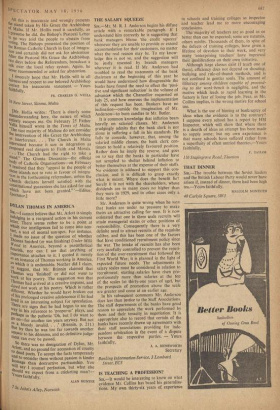THE SALARY SQUEEZE
SIR,—Mr. M. R. J. Anderson begins his diffuse article with a remarkable paragraph. If I
understand him correctly he is suggesting that hank managers blame 'the credit squeeze' whenever they are unable to provide or extend accommodation for their customers, no matter what the real reason may be. To my know- ledge this is not so, and the suggestion will be justly resented by branch managers wherever it is read. If Mr. Anderson had troubled to read the statements of the bank chairmen at the beginning of this year he would have understood how disagreeable the banks have found the need to effect the 'posi- tive and significant reduction' in the volume of advanceo which the Chancellor requested on July 25, and how onerous the implementation of this request has been. Bankers have no inclination—outside the imagination of Mr. Anderson—to burn candles to Mr. Butler.
It is common knowledge that inflation bears heavily on salaried classes. Mr. Anderson grudgingly admits that the bank clerk is not alone in suffering a fall in his standards. He fails to concede, however, , that, among the salaried middle classes, the bank clerk con- tinues to hold a relatively favoured position. Rather does he imply the reverse, and goes on to say that the banks in particular have not scrupled to shelter behind inflation to better themselves at the expense of their staffs. No evidence is adduced to support this con- clusion, and it is difficult to grasp exactly what is meant. Where does the benefit lie? Surely it is not with the shareholders, whose dividends are in many cases no higher than they were 111(1929, and in other cases only a little more?
Mr. Anderson is quite wrong when he says that banks are under no pressure to make theirs an attractive calling for men. It is now estimated that one in three wale recruits will attain managerial status or other positions of responsibility. Consequently there is a very definite need to attract recruits of the requisite calibre, and this has been one of the factors that have conditioned recruitment policy since the war. The intake of recruits has also been very carefully controlled to prevent the repeti- tion of the over-recruitment that followed the First World War; it is planned in the light of expected future needs. The adjustments in salary scales must be considered in relation to recruitment; starting salaries have risen pro- portionately more than salaries at the top of the scales (at thirty-one years of age), but the prospects of promotion above the scale are greater and come at an earlier age.
In his subsequent comments Mr. Anderson
does less than justice to the Staff Associations. The staff departments of the banks have good reason to appreciate the work performed by them and their tenacity, in negotiation. It is appropriate also to record that certain of the banks have recently drawn up agreements with their staff associations providing for inde- pendent arbitration in the event of a dispute between the respective parties. — Yours faithfully,
I. A. HUNSWORTH
Secretary Banking Information Service, 3 Lombard Street. EC3


































 Previous page
Previous page